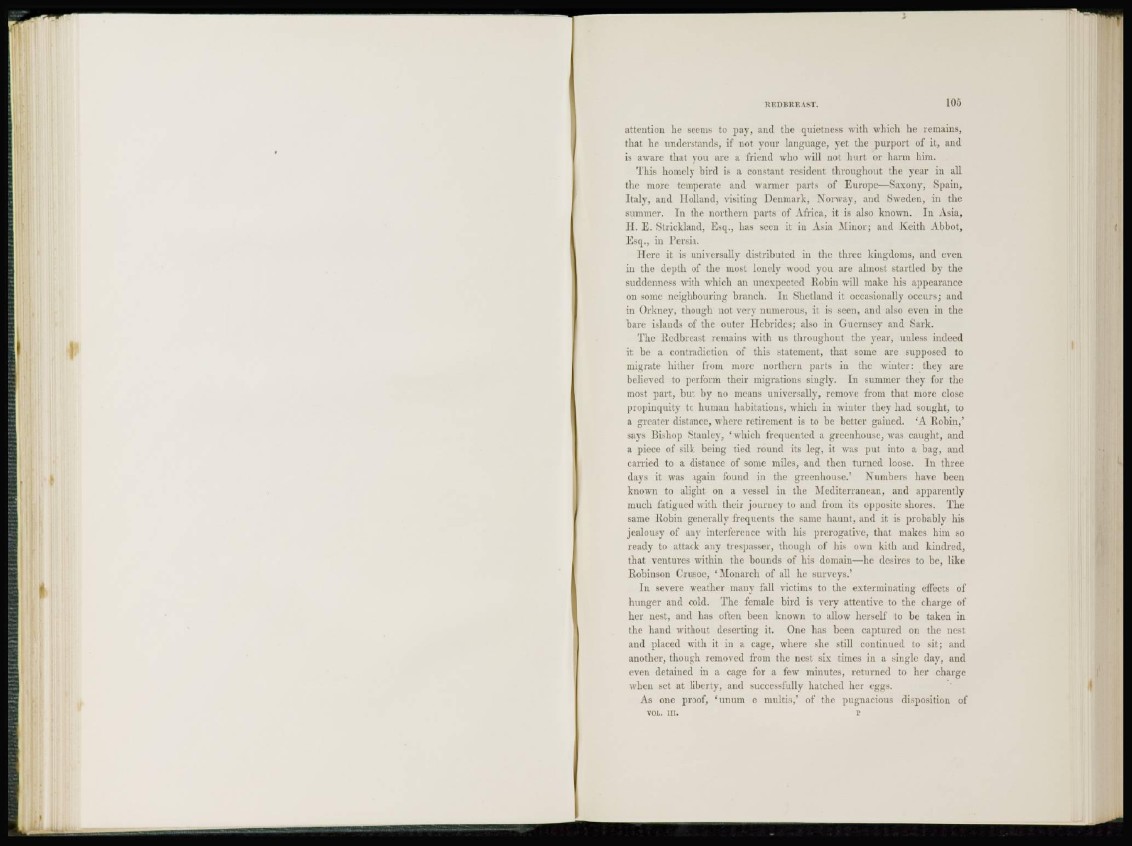
REDBRE Wl\ L05
attention he seems to pay, and the quietness with which he remains,
that he understands, if not your language, yet the purport of it, and
is aware that you are a friend who will not hurt or harm him.
This homely bird is a constant resident throughout the year in all
the more temperate and warmer parts of Europe—Saxony, Spain,
Italy, and Holland, visiting Denmark, Norway, and Sweden, in the
summer. In the northern parts of Africa, it is also known. In Asia,
H. E. Strickland, Esq., has seen it in Asia Minor; and Keith Abbot,
Esq., in Persia.
Here it is universally distributed in the three kingdoms, and even
in the depth of the most lonely wood you are almost startled by the
suddenness with which an unexpected Robin will make his appearance
on sonic neighbouring branch. In Shetland it occasionally occur--; and
in Orkney, though not very numerous, it is seen, and also even in the
bare islands of the outer Hebrides; also in Guernsey and Sark.
The Redbreast remains with us throughout the year, unless indeed
it be a contradiction of this statement, that some are supposed to
migrate hither from more northern parts in the winter: they are
believed to perforin their migrations singly. In summer they for the
most part, but by no means universally, remove from that more close
propinquity to human habitations, which in winter they had sought, to
a greater distance, where retirement is to be better gained. 'A Robin,'
says Bishop Stanley, 'which frequented a greenhouse, was caught, and
a piece of silk being tied round its leg, it was put into a bag, and
carried to a distance of some miles, and then turned loose. In three
days it was again found in the greenhouse.' Numbers have been
known to alight on a vessel in the Mediterranean, and apparently
much fatigued with their journey to and from its opposite shores. The
same Robin generally frequents the same haunt, and it is probably his
jealousy of any interference with his prerogative, that makes him so
ready to attack any trespasser, though of his own kith and kindred,
that ventures within the bounds of his domain—he desires to be, like
Robinson Crusoe, ' Monarch of all he surveys.'
In severe weather many fall victims to the exterminating effects of
hunger and cold. The female bird is very attentive to the charge of
her nest, and has often been known to allow herself to be taken in
the hand without deserting it. One has been captured on the nest
and placed with it in a cage, where she still continued to sit; and
another, though removed from the nest six times in a single day, and
even detained in a cage for a few minutes, returned to her charge
when set at liberty, and successfully hatched her eggs.
As one proof, 'unum e multis,' of the pugnacious disposition of
VOL. in. p